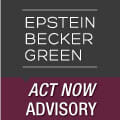
The Chicago City Council unanimously approved an ordinance, effective on July 1, 2017, requiring employers to provide employees with up to 40 hours of paid sick leave per year. Mayor Rahm Emanuel is expected to sign the ordinance into law.
Covered Employers and Employees
Employers covered by the ordinance include all individuals and business entities that employ at least one “covered employee” and (i) maintain a business within the geographical boundaries of the city of Chicago and/or (ii) are subject to Chicago license requirements. A “covered employee” is one who spends at least two hours of work in any two-week period in the city of Chicago. Compensated time spent travelling, such as making deliveries or sales calls (but not commuting time), is considered work within Chicago’s boundaries.
Domestic workers, including those employed by employers with fewer than four employees, are covered by the ordinance. Tipped employees must be paid Chicago’s minimum wage for sick leave.
Specific Terms of the Ordinance
A covered employee becomes eligible for paid sick leave by working 80 hours in any 120-day period. Employees begin to earn paid sick leave upon hiring or on the effective date of the ordinance, whichever is later. For every 40 hours of work, an employee earns one hour of paid sick leave, up to a maximum of 40 hours in a calendar year. Employees may carry over a maximum of 20 hours to the following calendar year. Employees covered by the federal Family and Medical Leave Act (“FMLA”) may carry over an additional 40 hours of paid sick leave to use exclusively for FMLA leave.
Employees may begin using paid sick leave on the 180th day after hire. Employers may require employees to use paid sick leave in reasonable minimum increments, provided that the minimum increment may not exceed four hours per day.
An employee may use sick leave when he or she (i) is ill or injured, or for purposes of receiving medical care; (ii) must care for a family member who is ill or injured, or receiving medical care; (iii) is a victim of domestic violence; or (iv) works at a place of business closed due to a public health emergency. If the need for sick leave is reasonably foreseeable (such as prescheduled medical appointments or court dates), an employer may require up to seven days’ advance notice. If such need is not reasonably foreseeable, employers may require employees to provide notice via phone, e-mail, or text message. If an employee is absent for more than three consecutive workdays, the employer may require certification that the sick leave was for one of the purposes set forth in the ordinance, but an employer may not require a health care provider to state the nature of the illness or medical treatment unless required by law.
Other Important Terms
Collective Bargaining Agreements. Nothing in the ordinance affects the terms of a collective bargaining agreement, and the paid sick leave provisions do not apply to employees in the construction industry who are covered by a collective bargaining agreement.
Notice. Employers are required to post at each Chicago facility where a covered worker is employed a notice setting forth his or her rights to paid sick leave. The city will be preparing a form notice. Employers are also required to provide employees with a notice of their rights under the ordinance with the first paycheck subject to the ordinance.
No Retaliation. Employers may not retaliate against employees for exercising their rights under the ordinance. In addition, employers may not consider paid sick time when determining discipline or discharge.
Right of Action. Employees may file a civil action for noncompliance with the ordinance, and they may recover as damages three times the amount of unpaid sick time, plus attorneys’ fees and costs.
What Employers Should Do Now
- Review and revise, as necessary, policies on sick time and sick pay, attendance, and notices of an absence to comply with the ordinance, when it becomes effective.
- Train supervisors before the ordinance’s effective date that the 40 hours of paid sick time in a year cannot be used to discipline or discharge an employee. In other words, no-fault attendance policies cannot be applied to the first 40 hours of absence under the ordinance.
- Budget appropriately to account for the additional pay that may be required to employees.
- Consider any production or scheduling changes that may become necessary as more employees begin to take time off, often without advance notice.
* * * *
For more information about this Advisory, the new Illinois law, or any other employment matter, please contact your regular Epstein Becker Green attorney or:
|
Julie Badel 312/499-1418 |
Mark M. Trapp |